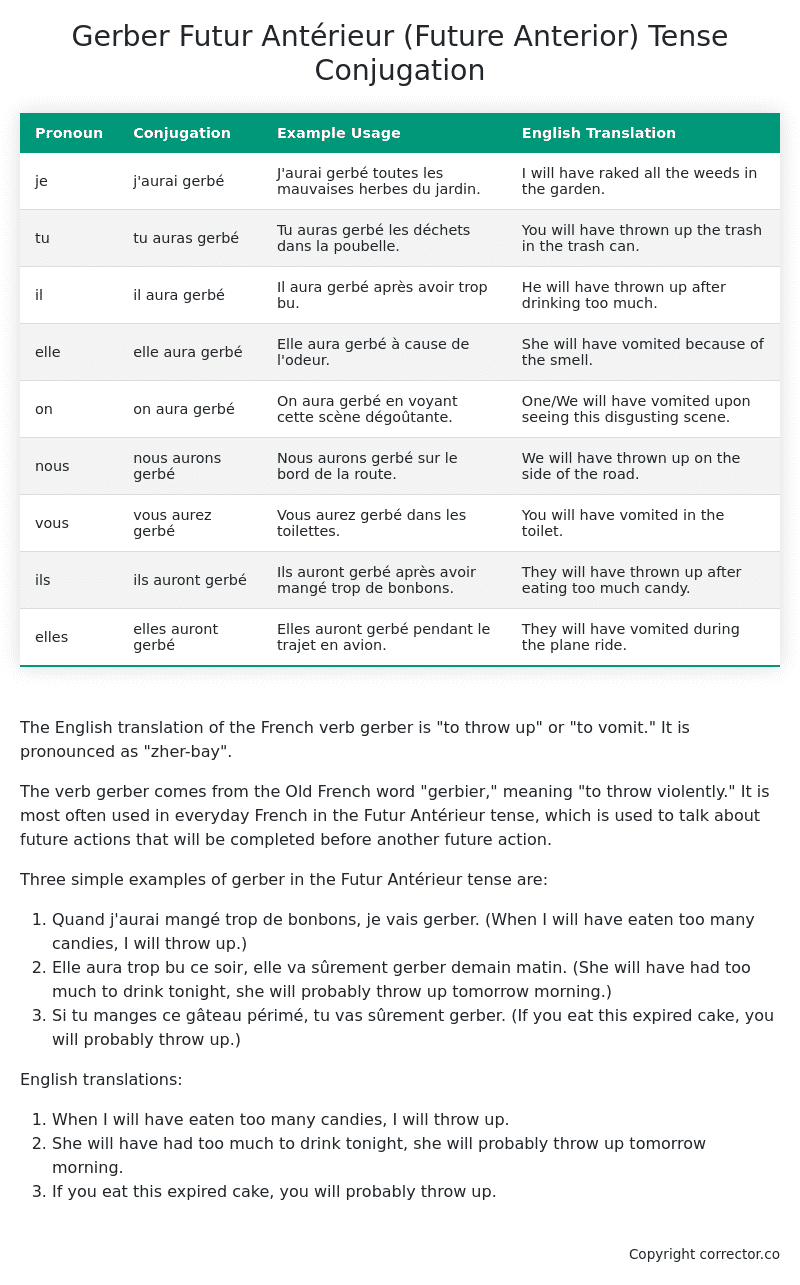Futur Antérieur (Future Anterior) Tense Conjugation of the French Verb gerber
Introduction to the verb gerber
The English translation of the French verb gerber is “to throw up” or “to vomit.” It is pronounced as “zher-bay”.
The verb gerber comes from the Old French word “gerbier,” meaning “to throw violently.” It is most often used in everyday French in the Futur Antérieur tense, which is used to talk about future actions that will be completed before another future action.
Three simple examples of gerber in the Futur Antérieur tense are:
- Quand j’aurai mangé trop de bonbons, je vais gerber. (When I will have eaten too many candies, I will throw up.)
- Elle aura trop bu ce soir, elle va sûrement gerber demain matin. (She will have had too much to drink tonight, she will probably throw up tomorrow morning.)
- Si tu manges ce gâteau périmé, tu vas sûrement gerber. (If you eat this expired cake, you will probably throw up.)
English translations:
- When I will have eaten too many candies, I will throw up.
- She will have had too much to drink tonight, she will probably throw up tomorrow morning.
- If you eat this expired cake, you will probably throw up.
Table of the Futur Antérieur (Future Anterior) Tense Conjugation of gerber
| Pronoun | Conjugation | Example Usage | English Translation |
|---|---|---|---|
| je | j’aurai gerbé | J’aurai gerbé toutes les mauvaises herbes du jardin. | I will have raked all the weeds in the garden. |
| tu | tu auras gerbé | Tu auras gerbé les déchets dans la poubelle. | You will have thrown up the trash in the trash can. |
| il | il aura gerbé | Il aura gerbé après avoir trop bu. | He will have thrown up after drinking too much. |
| elle | elle aura gerbé | Elle aura gerbé à cause de l’odeur. | She will have vomited because of the smell. |
| on | on aura gerbé | On aura gerbé en voyant cette scène dégoûtante. | One/We will have vomited upon seeing this disgusting scene. |
| nous | nous aurons gerbé | Nous aurons gerbé sur le bord de la route. | We will have thrown up on the side of the road. |
| vous | vous aurez gerbé | Vous aurez gerbé dans les toilettes. | You will have vomited in the toilet. |
| ils | ils auront gerbé | Ils auront gerbé après avoir mangé trop de bonbons. | They will have thrown up after eating too much candy. |
| elles | elles auront gerbé | Elles auront gerbé pendant le trajet en avion. | They will have vomited during the plane ride. |
Other Conjugations for Gerber.
Le Present (Present Tense) Conjugation of the French Verb gerber
Imparfait (Imperfect) Tense Conjugation of the French Verb gerber
Passé Simple (Simple Past) Tense Conjugation of the French Verb gerber
Passé Composé (Present Perfect) Tense Conjugation of the French Verb gerber
Futur Simple (Simple Future) Tense Conjugation of the French Verb gerber
Futur Proche (Near Future) Tense Conjugation of the French Verb gerber
Plus-que-parfait (Pluperfect) Tense Conjugation of the French Verb gerber
Passé Antérieur (Past Anterior) Tense Conjugation of the French Verb gerber
Futur Antérieur (Future Anterior) Tense Conjugation of the French Verb gerber (this article)
Subjonctif Présent (Subjunctive Present) Tense Conjugation of the French Verb gerber
Subjonctif Passé (Subjunctive Past) Tense Conjugation of the French Verb gerber
Subjonctif Imparfait (Subjunctive Imperfect) Tense Conjugation of the French Verb gerber
Subjonctif Plus-que-parfait (Subjunctive Pluperfect) Tense Conjugation of the French Verb gerber
Conditionnel Présent (Conditional Present) Tense Conjugation of the French Verb gerber
Conditionnel Passé (Conditional Past) Tense Conjugation of the French Verb gerber
L’impératif Présent (Imperative Present) Tense Conjugation of the French Verb gerber
L’infinitif Présent (Infinitive Present) Tense Conjugation of the French Verb gerber
Struggling with French verbs or the language in general? Why not use our free French Grammar Checker – no registration required!
Get a FREE Download Study Sheet of this Conjugation 🔥
Simply right click the image below, click “save image” and get your free reference for the gerber Futur Antérieur tense conjugation!

Gerber – About the French Futur Antérieur (Future Anterior) Tense
Construction
Common Everyday Usage Patterns
Interactions with Other Tenses
For example
Summary
I hope you enjoyed this article on the verb gerber. Still in a learning mood? Check out another TOTALLY random French verb conjugation!


